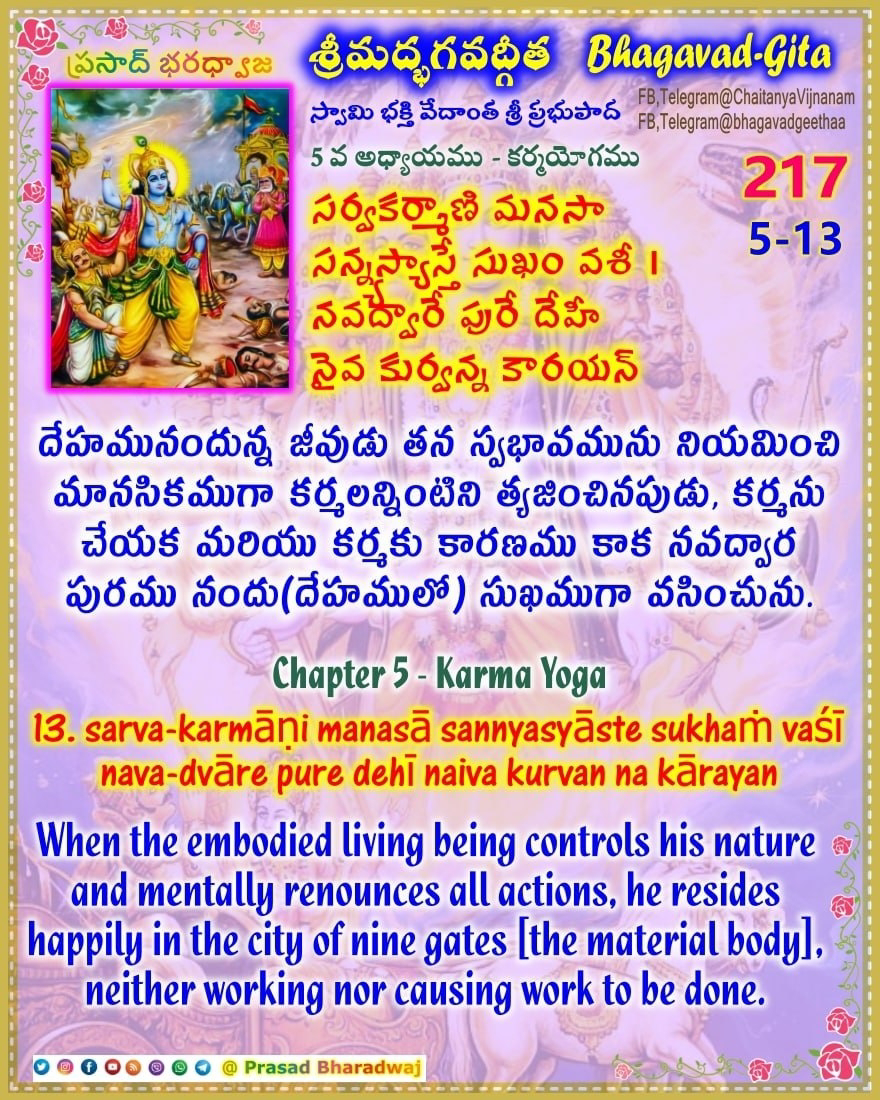శ్రీమద్భగవద్గీత - 217: 05వ అధ్., శ్లో 13 / Bhagavad-Gita - 217: Chap. 05, Ver. 13
🌹. శ్రీమద్భగవద్గీత - 217 / Bhagavad-Gita - 217 🌹
✍️. స్వామి భక్తి వేదాంత శ్రీ ప్రభుపాద
📚. ప్రసాద్ భరద్వాజ
🌴. 5 వ అధ్యాయము - కర్మయోగము - 13 🌴
13. సర్వకర్మాణి మనసా సన్న్యస్యాస్తే సుఖం వశీ |
నవద్వారే పురే దేహీ నైవ కుర్వన్న కారయన్
🌷. తాత్పర్యం :
దేహమునందున్న జీవుడు తన స్వభావమును నియమించి మానసికముగా కర్మలన్నింటిని త్యజించినపుడు, కర్మను చేయక మరియు కర్మకు కారణము కాక నవద్వారపురము నందు(దేహములో) సుఖముగా వసించును.
🌷. భాష్యము :
బద్ధజీవుడు నవద్వారములు గల పురమునందు నివసించును. దేహకర్మలు (దేహమనెడి పురము యొక్క కర్మలు) స్వాభావిక గుణము ననుసరించి వాటంతట అవే అప్రయత్నముగా నిర్వహింపబడును. దేహపరిస్థితుల ప్రభావమునకు లోనైయుండెడి జీవుడు ఒకవేళ తలచినచో వాటికి అతీతుడుగును కావచ్చును. జీవుడు తన ఉన్నతస్వభావమును మరచి దేహాత్మభావనను పొందుట వలననే దుఃఖము నొందుచున్నాడు.
కృష్ణభక్తిభావనలో అతడు తన సహజస్థితిని పునరిద్ధరించుకొని బంధము నుండి ముక్తుడు కాగలడు. కనుకనే కృష్ణభక్తిపరాయణుడైనంతనే మనుజుడు శీఘ్రముగా దేహపరకర్మల నుండి దూరుడగును. అటువంటి మారిన ప్రవృత్తులు కలిగిన నియమితజీవితము నందు అతడు నవద్వారపురములో సుఖుముగా జీవించును. నవద్వారములు ఈ క్రింది విధముగా తెలుపబడినవి.
నవద్వారే పురే దేహీ హంసో లీలాయతే బహి: |
వశీ సర్వస్య లోకస్య స్థావరస్య చరస్య చ
“జీవుని దేహమునందు నిలిచియుండెడి భగవానుడు విశ్వమునందలి సమస్తజీవులను నియమించువాడు. దేహము నవద్వారములను కలిగియుండును (రెండు కళ్ళు, రెండు నాసికారంధ్రములు, రెండు చెవులు, ఒకనోరు,మర్మావయము, గుదస్థానము). బద్ధస్థితిలో జీవుడు అట్టి దేహముతో తనను గుర్తించును. కాని హృదయస్థ పరమాత్మతో తనను అతడు గుర్తించినపుడు దేహమునందున్నపుడు భగవానుని వలె స్వతంత్రుడు కాగలదు (శ్వేతాశ్వతరోపనిషత్తు 3.18)”.
కనుకనే కృష్ణభక్తిరసభావనము నందున్నవాడు దేహము యొక్క అంతర్బాహ్య కర్మలన్నింటి నుండి స్వతంత్రుడై యుండును.
🌹 🌹 🌹 🌹 🌹
🌹 Bhagavad-Gita as It is - 217 🌹
✍️ Swami Bhakthi Vedantha Sri Prabhupada
📚 Prasad Bharadwaj
🌴 Chapter 5 - Karma Yoga - 13 🌴
13. sarva-karmāṇi manasā sannyasyāste sukhaṁ vaśī
nava-dvāre pure dehī naiva kurvan na kārayan
🌷 Translation :
When the embodied living being controls his nature and mentally renounces all actions, he resides happily in the city of nine gates [the material body], neither working nor causing work to be done.
🌹 Purport :
The embodied soul lives in the city of nine gates. The activities of the body, or the figurative city of body, are conducted automatically by its particular modes of nature. The soul, although subjecting himself to the conditions of the body, can be beyond those conditions, if he so desires. Owing only to forgetfulness of his superior nature, he identifies with the material body, and therefore suffers.
By Kṛṣṇa consciousness, he can revive his real position and thus come out of his embodiment. Therefore, when one takes to Kṛṣṇa consciousness, one at once becomes completely aloof from bodily activities. In such a controlled life, in which his deliberations are changed, he lives happily within the city of nine gates. The nine gates are mentioned as follows:
nava-dvāre pure dehī haṁso lelāyate bahiḥ
vaśī sarvasya lokasya sthāvarasya carasya ca
“The Supreme Personality of Godhead, who is living within the body of a living entity, is the controller of all living entities all over the universe. The body consists of nine gates [two eyes, two nostrils, two ears, one mouth, the anus and the genitals]. The living entity in his conditioned stage identifies himself with the body, but when he identifies himself with the Lord within himself, he becomes just as free as the Lord, even while in the body.” (Śvetāśvatara Upaniṣad 3.18)
Therefore, a Kṛṣṇa conscious person is free from both the outer and inner activities of the material body.
🌹 🌹 🌹 🌹 🌹
2 Dec 2019
